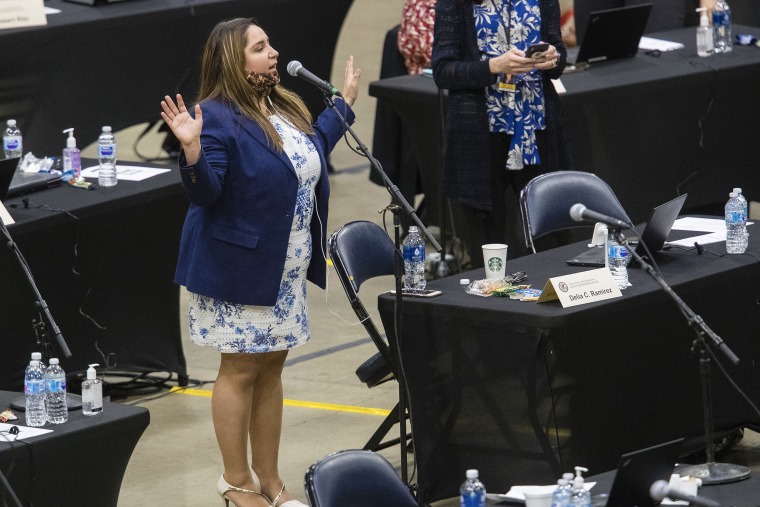Latinas are the largest group of women, after non-Hispanic whites, in the U.S. workforce, but they are barely represented in the work of writing the country’s laws and deciding how taxes and other revenue gets spent.
There are more than 12.6 million Hispanic women in the labor force, accounting for 16 percent of the female workforce, according to the Labor Department.
But in Congress, Latinas are about 3 percent of the voting representatives and senators.
In the House, which holds the country’s purse strings, 13 of the 435 voting members are Hispanic. Ten of them are Democrats, and three are Republicans. The Latina serving as Puerto Rico’s nonvoting House delegate is a Republican but does not have a vote.
Only one senator is Latina, Catherine Cortez Masto, D-Nev.

So PODER PAC, a Democratic political action committee, is combing through candidates in another midterm election to find Latinas it can help get elected to Congress.
“The fact that there are still so few at the table and on these important committees where these decisions are getting made, it’s just, it’s outrageous,” said Ingrid Durán, a Washington lobbyist who is PODER PAC’s board chair and founder. “That’s why we are laser-focused on getting more Latinas in Congress.”
PODER PAC began in 2008 with a mission to help get Latinas into all levels of public office, from school boards on up. But seeing the dearth of representation in Congress, the political fundraising group changed its focus in 2015 to backing congressional candidates.
It said the first candidates it is endorsing in the 2022 midterms are: Oregon state Rep. Andrea Salinas, a candidate in Oregon’s 6th Congressional District, Delia Ramirez in Illinois’ 3rd Congressional District and Dr. Yadira Caraveo in Colorado’s 8th Congressional District.
PODER PAC has always backed candidates who support abortion rights.
However, this year — with the future of the Roe v. Wade decision, which legalized abortions nationwide, under threat and a march across states of restrictive abortion laws — electing more Latinas who support abortion rights to Congress is that much more imperative for PODER PAC and its supporters, Durán said.
A Pew Research Center study last year found that about 58 percent of Hispanics believed abortion should be legal in all or most cases, about the same share as whites.
“That’s one of the pillars. If you are not a pro-choice Democratic Latina, we can’t support your candidacy,” Durán said.
PODER PAC uses an application process to choose candidates. Other criteria for endorsement include how candidates have supported the Latino community and whether they have helped other Latinas in their political aspirations.
The PAC gave $17,500 to Democrats in 2020, according to Open Secrets, after having raised $60,035. It has raised about $153,195 for this year’s election cycle, in addition to about $34,130 cash on hand.
In Oregon’s 6th Congressional District, Salinas faces several challengers, including state Rep. Teresa Alonso Leon, who also is Latina. Either would be the first Latino, male or female, to represent Oregon in Congress if she defeats the Republican candidate in the general election.
Ramirez, an Illinois state representative, faces two challengers in the Democratic primary, including a Latino, Gilbert Villegas, a member of the Chicago City Council. If she wins the general election in November, she would be the first Latina elected from the Midwest, according to PODER PAC.
Caraveo, a state representative, is also not the lone Latino in the Democratic primary for Colorado’s new 8th Congressional District. The newly added district is considered the most Hispanic in the state and one of the country’s most competitive districts, with a slight Republican lean. At least one Latino is running in the GOP primary.
According to PODER PAC, if Caraveo prevails in November, she would be the first Latina ever elected to federal office from Colorado.
Follow NBC Latino on Facebook, Twitter and Instagram.

